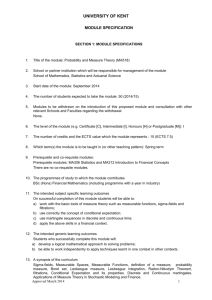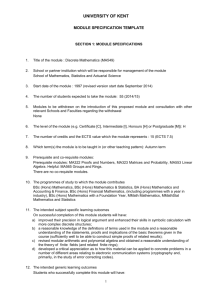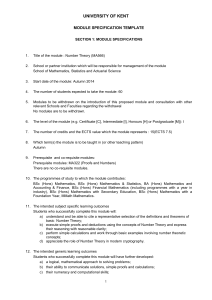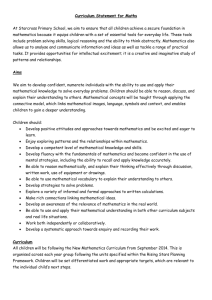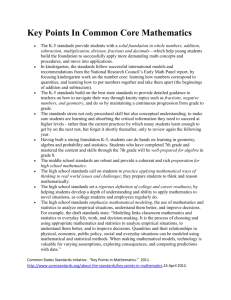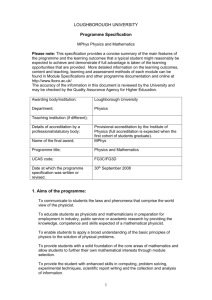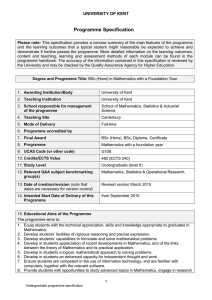section 1: module specification
advertisement
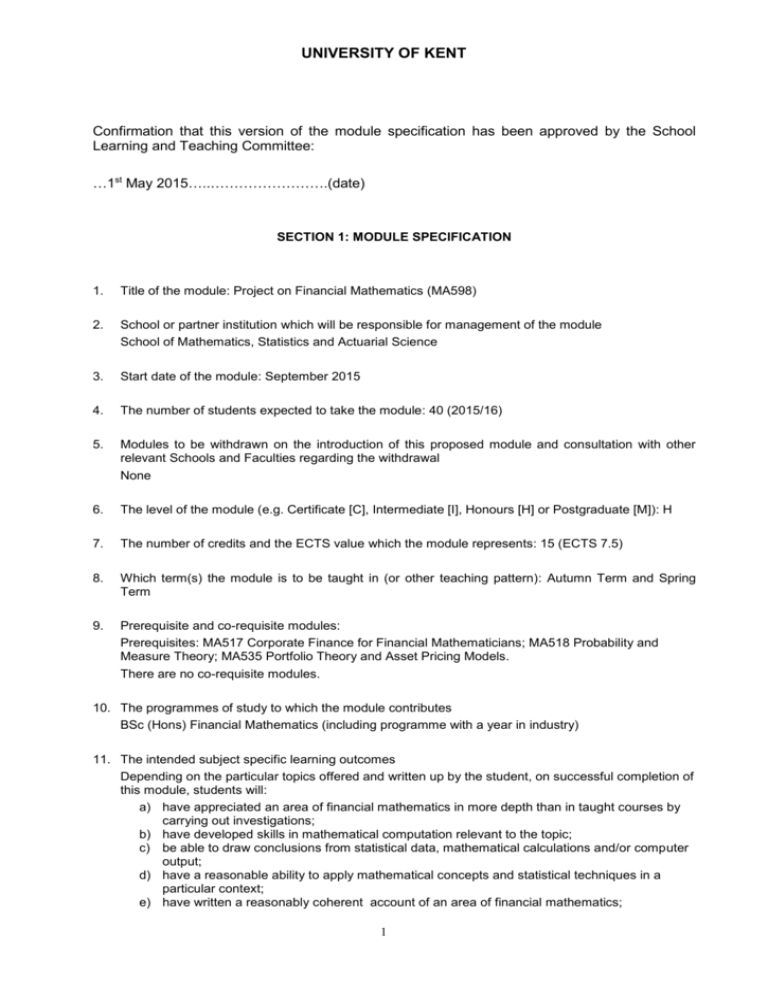
UNIVERSITY OF KENT Confirmation that this version of the module specification has been approved by the School Learning and Teaching Committee: …1st May 2015…..…………………….(date) SECTION 1: MODULE SPECIFICATION 1. Title of the module: Project on Financial Mathematics (MA598) 2. School or partner institution which will be responsible for management of the module School of Mathematics, Statistics and Actuarial Science 3. Start date of the module: September 2015 4. The number of students expected to take the module: 40 (2015/16) 5. Modules to be withdrawn on the introduction of this proposed module and consultation with other relevant Schools and Faculties regarding the withdrawal None 6. The level of the module (e.g. Certificate [C], Intermediate [I], Honours [H] or Postgraduate [M]): H 7. The number of credits and the ECTS value which the module represents: 15 (ECTS 7.5) 8. Which term(s) the module is to be taught in (or other teaching pattern): Autumn Term and Spring Term 9. Prerequisite and co-requisite modules: Prerequisites: MA517 Corporate Finance for Financial Mathematicians; MA518 Probability and Measure Theory; MA535 Portfolio Theory and Asset Pricing Models. There are no co-requisite modules. 10. The programmes of study to which the module contributes BSc (Hons) Financial Mathematics (including programme with a year in industry) 11. The intended subject specific learning outcomes Depending on the particular topics offered and written up by the student, on successful completion of this module, students will: a) have appreciated an area of financial mathematics in more depth than in taught courses by carrying out investigations; b) have developed skills in mathematical computation relevant to the topic; c) be able to draw conclusions from statistical data, mathematical calculations and/or computer output; d) have a reasonable ability to apply mathematical concepts and statistical techniques in a particular context; e) have written a reasonably coherent account of an area of financial mathematics; 1 UNIVERSITY OF KENT f) have performed computations that show their understanding of the techniques relevant to the topic; g) have improved their ability in mathematical and statistical modelling of particular problems 12. The intended generic learning outcomes On successful completion of this module, students will have: a) improved communication skills; b) enhanced intellectual independence; c) relevant computing skills; d) improved problem solving skills; e) improved skills in time management, working with others, organisation and studying so that tasks can be planned and implemented at a professional level. 13. A synopsis of the curriculum Students attend Key Skills workshops covering communication, use of sources and working as a team. They will be assigned to a small group (of the order of 4-6 students) to work on a project topic relating to one of the pre-requisite modules or another related topic in Financial Mathematics. Each MA598 project is supervised by a member of staff. The groups will meet regularly and will decide on their organisation and are advised to make arrangements to minute their meetings. There will be three one hour meetings with the project supervisor to provide guidance and assess progress. 14. Indicative Reading List Texts depend on the projects offered. For the Key Skills component: A Primer of Mathematical Writing, Stephen G. Krantz, A.M.S., 1997. How to think like a mathematician: a companion to undergraduate mathematics, Kevin Houston, C.U.P., 2009. Science Research Writing for Non-Native Speakers of English, Hilary Glasman-Deal, Imperial College Press, 2009. 15. Learning and Teaching Methods, including the nature and number of contact hours and the total study hours which will be expected of students, and how these relate to achievement of the intended module learning outcomes. The main intention of this module is to develop skills in communication, independent study and organisation. The module has six hours of Key Skills workshops covering communication, use of sources and working as a team, three one-hour meetings of the group with the project supervisor, and regular meetings of the project group. No of contact hours: 9 (workshops/group meeting with supervisor) Independent study hours: 141 (including group meetings without the supervisor) Total study hours: 150 By working on the project task, guided by the Key Skills workshops and feedback from the supervisor, the students will achieve learning outcomes 11(a)-(g) and 12(a)-(e). 2 UNIVERSITY OF KENT 16. Assessment methods and how these relate to testing achievement of the intended module learning outcomes The module is assessed on the basis of the project work submitted (50%), coursework related to the project (25%), and coursework related to the Key Skills component (25%). There is no written examination for this module. Project work: the group will work together on two separate projects. The preliminary project (worth 5% of the total module mark) will involve the group working together on a relatively simple task requiring teamwork, and production of a short report. This preliminary project will take place within the first two weeks of term. The main project (worth 45% of the total module mark) will involve the group working together under the guidance of the project supervisor, to produce a single written project. Typically the project might be 6,500 to 10,000 words in length. In addition, each individual student will submit a short report detailing his/her contribution to the group project and reflections on the project. The project is undertaken and assessed on a group basis. To be awarded the marks for the project component, the student is required to make a reasonable contribution to the project, as evidenced by the student’s individual reflections on the project and the notes from the group meeting (both those with and without the supervisor) which the group maintains on moodle and which list the attendees at each group meeting. Coursework related to the Key Skills component will consist of a writing task completed by students outside contact hours. This tests learning outcomes 11(e) and 12(a). Coursework related to the project test will consist of exercises completed by students under examination conditions, including, where appropriate, computer-based tasks, to test their understanding of the project topic. This tests learning outcomes 11(a)-(g). The coursework related to the project tests the learning outcomes 11(a)-(g) and 12(a)-(d). The project work tests all the learning outcomes 11(a)-(g) and 12(a)-(e). 17. Implications for learning resources, including staff, library, IT and space The module has been designed as a dedicated module for the BSc in Financial Mathematics. For these students, it will replace the 30-credit project module MA599. It is a smaller and more tailored project module than MA599. No extra resources will be required for this module. 18. The School recognises and has embedded the expectations of current disability equality legislation, and supports students with a declared disability or special educational need in its teaching. Within this module we will make reasonable adjustments wherever necessary, including additional or substitute materials, teaching modes or assessment methods for students who have declared and discussed their learning support needs. Arrangements for students with declared disabilities will be made on an individual basis, in consultation with the University’s disability/dyslexia support service, and specialist support will be provided where needed. 19. Campus where module will be delivered: Canterbury 3

